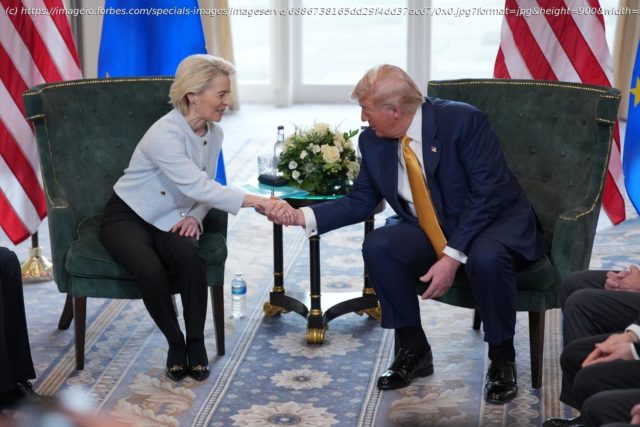United States, European Union stave off 30% U.S. tariffs on imports, due to start on Friday, at least for now. But what about pharmaceuticals?
President Trump and European Union President Ursula von der Leyen shook hands on a deal Sunday to stave off 30% tariffs on U.S. imports from the E.U., which could have been effective on Friday, though it remains unclear what the deal is.
Perhaps what they really agreed to is to stall for more time. Historically, trade agreements take a great deal of time and review before being announced.
That said, it appears that most if not all U.S. imports from the European Union will face a 15% tariff. That’s one area of disagreement if not among the two parties, then at least among the first reporting on the limited “details.”
It also appears that most U.S. exports to the 27 nations of the European Union will not have a tariff. That’s another area of disagreement, at least in the early reporting.
That 15% tariff on U.S. imports is up slightly from the 10% “baseline” tariff already in place with all countries of the world since Trump began the global trade war to reduce the U.S. deficit, which is still increasing.
It is, of course, significantly higher than the 1.2% tariff rate on U.S. imports from the European Union that preceded it. (The “deal” would seem to lower the 25% tariff in place on passenger vehicle imports into the United States.)
On the U.S. export side, the zero tariff rate would replace a rate of 2.8%, so not a big change. But a spokesperson for the European Union would not respond to a “request for comment about Trump’s claim.»
Here’s where it gets really important: Does the 15% tariff on E.U. imports include critical medicines and the compounds used to make those medicines, imports into the United States that Ireland and other European nations dominate?
President Trump says no, according to one news source. “We have 15% for pharmaceuticals,” Von der Leyen said, according to another.
I wrote last week about the risk of the trade war on Americans’ access to important medicines because of the United States’ reliance on Europe for so many medicines and a great deal of the chemical compounds used to produce drugs here.
Regardless of whether pharmaceuticals are hit with 15% tariffs or not, it is not hard to imagine that whatever tariffs are ultimately imposed will put pressure on prices as the U.S. government collects revenues from the European Union and a host of other nations.
One thing on which Trump and van der Leyen did agree was that making a deal was important to both sides, given the strength of the trading relationship.






